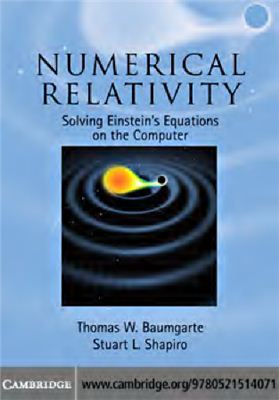Cambridge University Press, 2010, 698 p. Aimed at students and
researchers entering the field, this pedagogical introduction to
numerical relativity will also interest scientists seeking a broad
survey of its challenges and achievements. Assuming only a basic
knowledge of classical general
relativity, this textbook develops the mathematical formalism from first principles, then highlights some of the pioneering simulations involving black holes and neutron stars, gravitational collapse and gravitational waves. The book contains 300 exercises to help readers master new material as it is presented. Numerous illustrations, many in color, assist in visualizing new geometric
concepts and highlighting the results of computer simulations. Summary boxes encapsulate some of the most important results for quick reference. Applications covered include calculations of coalescing binary black holes and binary neutron stars, rotating stars, colliding star clusters, gravitational and magnetorotational collapse, critical phenomena, the generation of gravitational waves, and other topics of current physical and astrophysical significance.
relativity, this textbook develops the mathematical formalism from first principles, then highlights some of the pioneering simulations involving black holes and neutron stars, gravitational collapse and gravitational waves. The book contains 300 exercises to help readers master new material as it is presented. Numerous illustrations, many in color, assist in visualizing new geometric
concepts and highlighting the results of computer simulations. Summary boxes encapsulate some of the most important results for quick reference. Applications covered include calculations of coalescing binary black holes and binary neutron stars, rotating stars, colliding star clusters, gravitational and magnetorotational collapse, critical phenomena, the generation of gravitational waves, and other topics of current physical and astrophysical significance.

